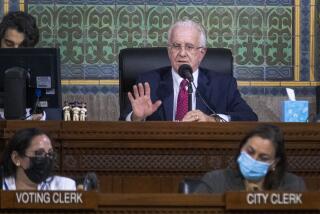Councilman Is Fined $10,000 Over Mailings : Politics: Daniel Griset of Santa Ana receives maximum penalty for five improper campaign mailings sent during his 1988 bid for reelection.
- Share via
SANTA ANA — The state Fair Political Practices Commission on Thursday fined Santa Ana Councilman Daniel E. Griset $10,000, the maximum possible penalty, for five improper campaign mailings sent during his 1988 bid for reelection.
The FPPC imposed the fine after Administrative Law Judge Jerry Mitchell recommended the maximum possible penalty last December after a review of the case, FPPC spokesman Jay Greenwood said. The FPPC can impose fines of up to $2,000 for each violation, he said.
Griset declined to comment on the ruling and referred calls to his attorney, Darryl R. Wold, who said the councilman will appeal the decision.
Wold said Griset plans to ask for a judicial review of the FPPC decision in Orange County Superior Court. If the FPPC decision is upheld, Griset will then file an appeal with the appellate court, Wold said.
“There is no dispute about the facts,” Wold said. “But the commission has, maybe harshly, applied the literal language of the Political Reform Act. We think that the section that they applied is unconstitutional.”
The FPPC last March accused Griset and two of his campaign committees of “negligently or purposely” violating the state’s Political Reform Act by failing to properly identify the source of five mailings, which included harsh criticisms of Griset’s opponent, Richards L. Norton.
According to the FPPC, Griset’s campaign committees sent out four mailings that were identified as coming from the “Santa Ana Progress Committee.” Each mass mailing reached about 29,000 people and contained such titles as “Meet the Real Rick Norton,” “Beware of Tricksters” and “7 Lies.”
A fifth mailer, sent to 300 people, was on the letterhead of the Washington Square Neighborhood Assn. Griset lives in Washington Square.
None of the five mailings identified Griset or his campaign committees as the sender, Greenwood said.
“By requiring the true sender to be identified, voters are better able to evaluate the political message being sent,” Greenwood said.
Griset, in turn, filed a lawsuit against the FPPC. The suit alleged that the section of the state’s Political Reform Act, which established the FPPC, is unconstitutional on the grounds that the government cannot prohibit anonymous political statements. Griset’s request for an injunction against the FPPC to prevent it from continuing its case against him was denied in December.
The FPPC’s investigation of the mailings came at the request of Norton, who lost to Griset in the 1988 election but won a council seat in 1989.
In a prepared statement issued Thursday, Norton said of the FPPC ruling: “I’m not surprised. In my opinion, this is part of the continuing story of how Dan Griset and his cronies have continually deceived the public. It has taken many years, but, finally, Griset is beginning to pay for his actions.”
More to Read
Sign up for Essential California
The most important California stories and recommendations in your inbox every morning.
You may occasionally receive promotional content from the Los Angeles Times.













